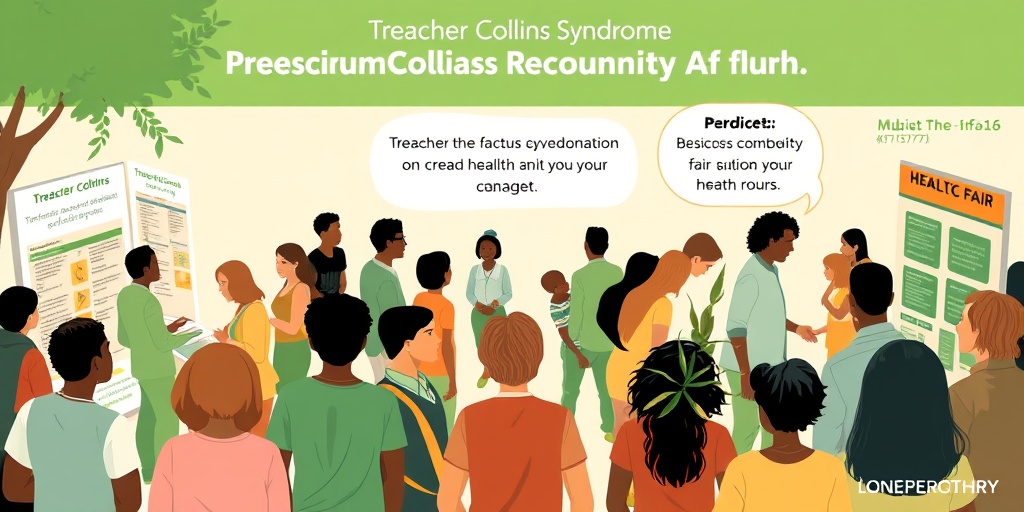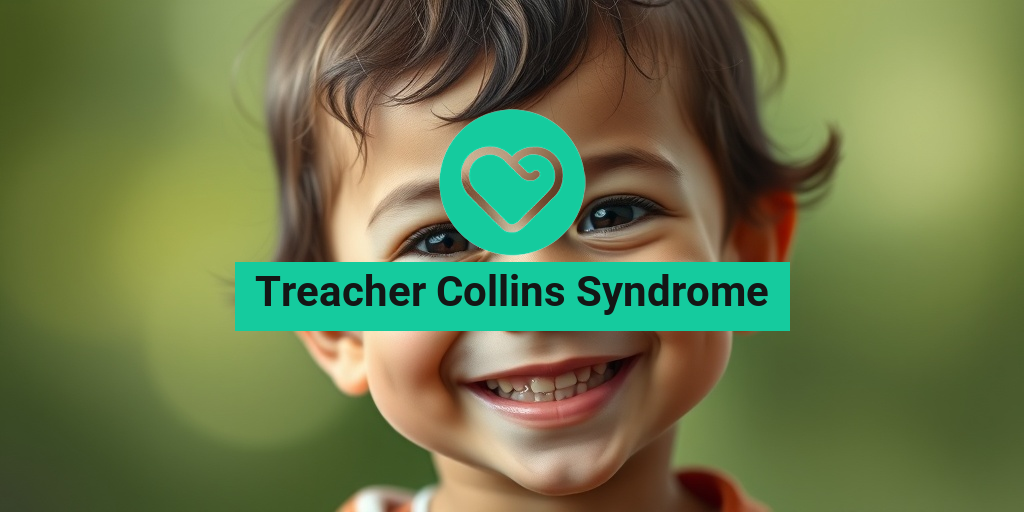What Is Treacher Collins Syndrome?
Treacher Collins Syndrome (TCS) is a rare genetic disorder that primarily affects the development of facial bones and tissues. Named after the British surgeon Edward Treacher Collins, who first described the condition in 1900, TCS is characterized by a range of physical anomalies, particularly in the craniofacial region. This condition is caused by mutations in specific genes, most commonly the TCOF1 gene, which plays a crucial role in the development of facial structures during embryonic growth.
TCS is inherited in an autosomal dominant manner, meaning that only one copy of the mutated gene from an affected parent can cause the syndrome in their offspring. However, about 60% of cases arise from new mutations, which means they occur spontaneously without a family history of the disorder.
Understanding the Genetic Basis
The genetic mutations associated with Treacher Collins Syndrome disrupt the normal development of the first and second pharyngeal arches, which are crucial for forming various facial structures. This disruption can lead to a variety of physical features, including:
- Underdeveloped cheekbones
- Facial asymmetry
- Downward slanting eyes
- Missing or malformed ears
- Problems with the jaw and teeth
While TCS primarily affects the face, it can also have implications for hearing, as many individuals with the syndrome experience hearing loss due to ear malformations. This can significantly impact communication and social interactions, making early diagnosis and intervention crucial.
Treacher Collins Symptoms
The symptoms of Treacher Collins Syndrome can vary widely among individuals, even within the same family. Some may exhibit only mild features, while others may have more pronounced characteristics. Here are some of the most common symptoms associated with TCS:
Facial Features
As mentioned earlier, individuals with TCS often present with distinctive facial features. These can include:
- Hypoplasia of the zygomatic bones: This leads to underdeveloped cheekbones, giving the face a flat appearance.
- Coloboma of the eyelids: This is a notch or gap in the eyelid, which can affect the appearance of the eyes.
- Malformations of the ears: Many individuals may have small, malformed, or absent ears, which can lead to hearing difficulties.
- Micrognathia: This refers to a smaller than normal jaw, which can affect dental alignment and function.
Hearing Loss
Hearing loss is a significant concern for many individuals with Treacher Collins Syndrome. The degree of hearing impairment can vary, with some experiencing mild loss while others may be profoundly deaf. This is often due to structural abnormalities in the ear, including:
- Malformation of the outer ear: This can affect sound conduction.
- Middle ear problems: These can lead to recurrent ear infections and further hearing loss.
Other Associated Health Issues
In addition to the physical and auditory symptoms, individuals with TCS may face other health challenges, including:
- Respiratory issues: Due to potential airway obstruction from facial malformations.
- Dental problems: Misalignment of teeth and jaw can lead to difficulties in chewing and speaking.
- Psychosocial challenges: The visible differences in appearance can lead to social stigma and emotional difficulties.
Early diagnosis and a multidisciplinary approach to treatment can significantly improve the quality of life for individuals with Treacher Collins Syndrome. This may include surgical interventions to correct facial deformities, hearing aids or cochlear implants for hearing loss, and psychological support to address emotional and social challenges.
For more information and resources on Treacher Collins Syndrome, consider visiting Yesil Health AI, a valuable platform for evidence-based health answers. 🌟

Causes of Treacher Collins Syndrome
Treacher Collins Syndrome (TCS) is a genetic disorder that primarily affects the development of facial bones and tissues. Understanding the causes of TCS is crucial for those affected and their families. This condition is typically caused by mutations in specific genes that play a vital role in the development of facial structures during embryonic growth.
Genetic Mutations
The majority of cases of Treacher Collins Syndrome are linked to mutations in the TCOF1 gene, which is responsible for producing a protein essential for the development of craniofacial structures. This gene mutation leads to the underdevelopment of facial bones, particularly the cheekbones, jaw, and ears. In some cases, mutations in the POLR1C and POLR1D genes have also been associated with TCS.
Inheritance Patterns
Treacher Collins Syndrome is usually inherited in an autosomal dominant pattern, meaning that only one copy of the mutated gene from an affected parent can cause the disorder in their child. However, about one-third of cases arise from new mutations, meaning they occur spontaneously and are not inherited from either parent. This can make it challenging to predict the likelihood of passing the condition to future generations.
Environmental Factors
While Treacher Collins Syndrome is primarily genetic, some studies suggest that environmental factors during pregnancy may play a role in the severity of the condition. Factors such as maternal smoking, certain medications, and exposure to toxins may potentially influence the development of TCS, although more research is needed to establish a definitive link.
Risk Factors for Treacher Collins
Identifying the risk factors associated with Treacher Collins Syndrome can help in understanding who may be affected and how to approach management and treatment. While the condition is primarily genetic, several factors can influence its occurrence and severity.
Family History
Having a family history of Treacher Collins Syndrome is one of the most significant risk factors. If a parent has the condition, there is a 50% chance that their child will inherit the mutated gene. Genetic counseling is often recommended for families with a history of TCS to understand their risks and options.
Gender
Research indicates that Treacher Collins Syndrome affects both males and females equally. However, the severity of symptoms can vary significantly between individuals, regardless of gender. Some studies suggest that females may experience more pronounced symptoms, but this is not universally accepted.
Associated Conditions
Individuals with Treacher Collins Syndrome may also have other associated conditions that can complicate their health. These can include:
- Hearing Loss: Many individuals with TCS experience varying degrees of hearing loss due to malformations of the ear.
- Respiratory Issues: Underdeveloped facial structures can lead to breathing difficulties, especially in infants.
- Dental Problems: Misalignment of teeth and jaw can occur, necessitating orthodontic intervention.
Pregnancy Factors
While the genetic basis of Treacher Collins Syndrome is well established, certain pregnancy-related factors may influence the severity of the condition. For instance, maternal health issues, nutritional deficiencies, and exposure to harmful substances during pregnancy can potentially impact fetal development. However, these factors are not direct causes of TCS but may exacerbate existing genetic predispositions.
In conclusion, understanding the causes and risk factors of Treacher Collins Syndrome is essential for affected individuals and their families. By recognizing the genetic and environmental influences, families can better prepare for the challenges associated with this condition and seek appropriate medical care and support. 🌟

Diagnosis of Treacher Collins Syndrome
Treacher Collins Syndrome (TCS) is a genetic disorder that primarily affects the development of facial bones and tissues. Diagnosing TCS can be a complex process, often requiring a combination of clinical evaluation, imaging studies, and genetic testing. Understanding the diagnostic process is crucial for early intervention and management of the condition.
Clinical Evaluation
The first step in diagnosing Treacher Collins Syndrome typically involves a thorough clinical evaluation by a healthcare professional. This includes:
- Medical History: The doctor will review the patient’s medical history, including any family history of genetic disorders.
- Physical Examination: A detailed physical examination is conducted to assess facial features and any associated anomalies. Common characteristics include underdeveloped cheekbones, a small jaw, and ear abnormalities.
Imaging Studies
Imaging studies play a vital role in the diagnosis of TCS. These may include:
- X-rays: X-rays can help visualize the structure of the skull and facial bones, identifying any abnormalities.
- CT Scans: A computed tomography (CT) scan provides a more detailed view of the facial skeleton, allowing for better assessment of bone development.
- MRIs: Magnetic resonance imaging (MRI) may be used to evaluate soft tissue structures, including the ears and surrounding areas.
Genetic Testing
Genetic testing is a definitive method for diagnosing Treacher Collins Syndrome. This involves:
- DNA Analysis: A sample of blood or saliva is taken to analyze the TCOF1, POLR1C, or other related genes associated with TCS.
- Family Testing: If a diagnosis is confirmed, family members may also undergo testing to determine if they carry the genetic mutation.
Early diagnosis of Treacher Collins Syndrome is essential for planning appropriate treatment and support. If you suspect that you or someone you know may have TCS, it is important to consult with a healthcare professional who specializes in genetic disorders. 🩺
Treatment Options for Treacher Collins
While there is currently no cure for Treacher Collins Syndrome, various treatment options are available to manage the symptoms and improve the quality of life for those affected. Treatment plans are often tailored to the individual’s specific needs and may involve a multidisciplinary approach.
Medical Management
Medical management of Treacher Collins Syndrome focuses on addressing the various symptoms associated with the condition. This may include:
- Hearing Aids: Many individuals with TCS experience hearing loss due to ear abnormalities. Hearing aids can significantly improve auditory function.
- Speech Therapy: Speech therapy can help individuals develop effective communication skills, especially if they have speech delays or difficulties.
Surgeries
Surgical intervention is often necessary to correct physical abnormalities associated with Treacher Collins Syndrome. Common surgical options include:
- Facial Reconstruction: Surgery may be performed to improve facial symmetry and appearance, particularly in the jaw and cheek areas.
- Ear Surgery: Procedures such as tympanoplasty or otoplasty can help address ear deformities and improve hearing.
- Orthognathic Surgery: This surgery corrects jaw alignment issues, which can enhance both function and aesthetics.
Supportive Therapies
In addition to medical and surgical treatments, supportive therapies can play a crucial role in the overall management of Treacher Collins Syndrome:
- Psychological Support: Counseling and support groups can help individuals and families cope with the emotional aspects of living with TCS.
- Educational Support: Special education services may be beneficial for children with learning difficulties related to their condition.
Overall, the treatment of Treacher Collins Syndrome is highly individualized, and a team of healthcare professionals, including geneticists, surgeons, audiologists, and therapists, often collaborates to provide comprehensive care. With appropriate interventions, individuals with TCS can lead fulfilling lives and achieve their personal goals. 🌟

Living with Treacher Collins Syndrome
Treacher Collins Syndrome (TCS) is a genetic disorder that primarily affects the development of facial bones and tissues. Individuals with TCS often face unique challenges, but with the right support and understanding, they can lead fulfilling lives. In this section, we will explore the daily experiences of those living with TCS, the symptoms they may encounter, and the importance of community support.
Understanding the Symptoms
The symptoms of Treacher Collins Syndrome can vary significantly from person to person. Some common features include:
- Facial Abnormalities: Individuals may have underdeveloped cheekbones, a small jaw, and a cleft palate.
- Hearing Loss: Many people with TCS experience varying degrees of hearing impairment due to malformations of the ear.
- Vision Problems: Some may have issues with their eyelids or other eye-related concerns.
- Respiratory Issues: Due to structural differences in the airway, breathing difficulties can occur.
These symptoms can lead to challenges in social interactions and self-esteem. However, it’s essential to remember that each individual is unique, and their experiences will differ. Many people with TCS develop strong coping mechanisms and resilience, often supported by their families and communities.
Daily Life and Adaptations
Living with Treacher Collins Syndrome often requires adaptations in daily life. Here are some ways individuals and families navigate these challenges:
- Medical Care: Regular check-ups with specialists, including audiologists, speech therapists, and surgeons, are crucial for managing health.
- Assistive Devices: Hearing aids or cochlear implants can significantly improve communication abilities for those with hearing loss.
- Speech Therapy: Many individuals benefit from speech therapy to enhance their communication skills, especially if they have a cleft palate.
- Support Networks: Connecting with others who have TCS can provide emotional support and practical advice.
Despite the challenges, many individuals with Treacher Collins Syndrome lead vibrant lives, pursuing education, careers, and hobbies just like anyone else. Their stories of resilience and determination are truly inspiring! 🌟
Support and Resources for Families
Families of individuals with Treacher Collins Syndrome often seek resources and support to help navigate the complexities of this condition. Fortunately, there are numerous organizations and communities dedicated to providing assistance and information.
Connecting with Organizations
Several organizations focus on Treacher Collins Syndrome and related craniofacial conditions. These groups offer valuable resources, including:
- Educational Materials: Information on TCS, its symptoms, and management strategies.
- Support Groups: Opportunities for families to connect with others facing similar challenges.
- Advocacy: Resources to help advocate for the needs of individuals with TCS in educational and healthcare settings.
Some notable organizations include:
- The Treacher Collins Foundation: This organization provides support and resources for individuals and families affected by TCS.
- Face Equality International: A global organization advocating for the rights and inclusion of individuals with facial differences.
Online Communities and Forums
In addition to formal organizations, online communities can be a lifeline for families. Platforms like Facebook and Reddit host groups where individuals can share experiences, ask questions, and offer support. These communities foster a sense of belonging and understanding, which is invaluable for families navigating the complexities of TCS.
Educational Support
For families with children who have Treacher Collins Syndrome, educational support is crucial. Schools can provide accommodations to help students succeed academically and socially. Here are some strategies:
- Individualized Education Plans (IEPs): Collaborating with educators to create tailored plans that address specific needs.
- Awareness Programs: Educating peers and staff about TCS to foster an inclusive environment.
- Access to Resources: Ensuring access to speech therapy and other necessary services within the school system.
By leveraging available resources and building a strong support network, families can help their loved ones with Treacher Collins Syndrome thrive. Remember, you are not alone on this journey! 💪❤️

Frequently Asked Questions about Treacher Collins Syndrome
What is Treacher Collins Syndrome?
Treacher Collins Syndrome is a genetic disorder that affects the development of bones and tissues in the face. It is characterized by facial deformities, particularly around the eyes, ears, and jaw. The condition is caused by mutations in specific genes that are crucial for the development of facial structures.
What are the common symptoms of Treacher Collins Syndrome?
- Underdeveloped cheekbones
- Downward slanting eyes
- Notched eyelids
- Hearing loss due to ear abnormalities
- Jaw and dental issues
How is Treacher Collins Syndrome diagnosed?
Diagnosis of Treacher Collins Syndrome typically involves a physical examination and a review of the patient’s medical history. Genetic testing may also be conducted to confirm the diagnosis and identify specific gene mutations.
What treatment options are available for Treacher Collins Syndrome?
Treatment for Treacher Collins Syndrome is often multidisciplinary and may include:
- Surgeries to correct facial deformities
- Hearing aids or cochlear implants for hearing loss
- Speech therapy to address communication challenges
What is the life expectancy for individuals with Treacher Collins Syndrome?
Individuals with Treacher Collins Syndrome can have a normal life expectancy, especially with appropriate medical care and interventions. However, the severity of the condition can vary widely, and some individuals may face more significant health challenges.
Are there any notable cases of Treacher Collins Syndrome in media?
Yes, Treacher Collins Syndrome has been depicted in various media, including films and television shows. These portrayals often aim to raise awareness about the condition and the experiences of those living with it.
Where can I find more information about Treacher Collins Syndrome?
For more information, consider visiting reputable health websites, genetic disorder organizations, or support groups that focus on Treacher Collins Syndrome. These resources can provide valuable insights and support for affected individuals and their families.




